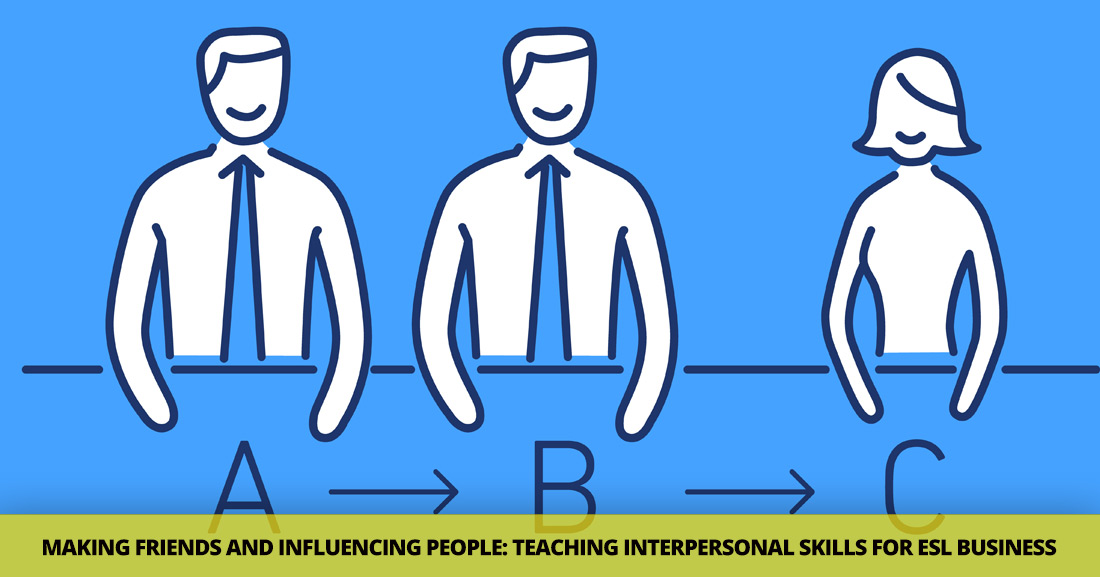
After teaching ESL for twelve years, I felt like a new challenge.
My school was struggling to hire ESL Business teachers, so I volunteered. I’m not trained in business or economics, but I found that a few hours’ research equipped me sufficiently to guide ESL students through the most important topics. Ultimately, it’s just another subject area, like the weather, or sports, or family life, and if you’re looking for a fresh challenge, I encourage you to give it a try.
Your ESL Business students are going to need a range of skills in order to succeed in their professional lives. Whether they’re heading into the world of work, about to begin an MBA, or just brushing up on their English, people skills are going to be central to their success. I’ve found that interpersonal skills rely on a mix of language ability and something that’s more difficult to teach and learn – personal confidence and experience. Realistic scenarios can help to prepare our students for the real thing. They’re also a fun and engaging way of practicing the material, and they remind the class that ESL Business lessons are not an end in themselves, but a period of preparation before embarking on the challenges of the business world.
4 Ideas for Teaching Interpersonal Skills for ESL Business
-
1
Good Communications
I like to begin by inviting my students to characterize a ‘good communicator’. We brainstorm vocabulary which describes someone who is able to express themselves, but also able to listen well to others:
Vocab: Reasonable, moderate, open, welcoming, compassionate, prepared, thoughtful, empathic, convivial, confident, eloquent, strong, approachable
We then brainstorm the opposite, those traits which mark someone as a poor communicator. Many of these proved also to be characteristics of a poor manager:
Vocab: selfish, dominant, ignorant, superior, dismissive, unfeeling, heartless, silent, tight-lipped, a bully, a tyrant, a dinosaur, a dictator
I ask lots of check questions for this broad range of vocabulary, eliciting the adjectives by giving examples of behavior (e.g. ‘What can I call someone who thinks of themselves as better than others?’ or, ‘What’s the word for someone who can easily see another person’s point of view?’)
-
2
Good Meetings
We move on to talk about meetings. Many business people (perhaps even most of them) regard a lot of the meetings in which they’re involved as a waste of time, and resent having to sit around a table while others hold court. The chief complaints seem to be that the group isn’t equal, that time isn’t fairly shared, or that the meeting doesn’t have clear enough aims.
My class brainstormed advice intended to help meetings proceed more smoothly, and with better outcomes. Typically, they respond with:
- Write an agenda, preferably more than a few hours in advance, so that everyone can prepare. This also gives the meeting a visible structure.
- All of the stakeholders should have input into the agenda, and it should then be moderated and finalized by the chair.
- The meeting should have clear points of focus – perhaps one, or more than one – to which the chair obliges everyone to adhere
- The chair should be a confident and able moderator, ready to steer the discussion towards the specific themes, but never overly firm or aggressive.
- The chair/moderator should ensure that everyone has an equal share of the given time, and that no one dominates.
- The meeting should close with the agreement of Action Points, which should be individually assigned tasks with an attached timeframe and criteria for success.
Speaking with my business students, I find it remarkable how few meetings seem to meet all, or even some, of these criteria. Our classes therefore become a chance to refine business and personal philosophies, as well as practice the relevant language.
Once the traits and philosophies of a good meeting are agreed, you can hold a meeting in the classroom, with an assigned moderator (see below for scenario ideas).
-
3
Networking
Networking events are stressful for a lot of people, even those for whom such gatherings are central to the success of their business. I asked my class to research how a business person might get the best out of a networking event, and offer some advice about calming the anxieties many of us feel when thrust into a room full of strangers:
- Prepare carefully. Bring business cards and try to research who will be at the event. Decide how many cards you’d like to give out (5-7 seemed reasonable to my classes) and if there’s anyone in particular you’d like to meet.
- Relax and remember that we’re all, on some level, nervous in these situations. Everyone in the room wishes you success and wants to help you.
- Listen carefully when people are describing what they’re working on. As you listen, refrain from mentally composing your next comment; instead, think of pertinent questions to ask, so that you demonstrate a genuine interest in what’s being said. Too many people are just waiting for the next chance to express themselves, rather than to learn about others.
- Always have a good answer to the most routine networking question: ‘What are you working on at the moment?’ Rehearse this answer a little, so that it’s concise and sounds interesting.
- Resist the temptation to stick with people you know.
- Be careful how much you drink (if applicable).
- Follow up your initial meetings with an email a day or so later, to remind the person who you are, and to ask more questions, propose a further meeting, or offer some type of collaboration.
Again, you can now hold a mock networking event, assigning your students specific tasks. Ask them to hand out a certain number of business cards, find and speak with a particular person, or discover a piece of information.
-
4
Realistic Situations
My business students carry out a lot of role-play exercises, based both on situations given in our textbooks, and scenarios that I design for the class. I like to vary these situations throughout the course, but good occasions for fictional business scenarios include:
- Congratulating a colleague on an achievement or award
- Apologizing to a customer for a failure in your service or a faulty product
- Resolving a conflict between two team members
- Making arrangements for a meeting or business trip
I like to write role cards for these situations, and think carefully about how the exercise will proceed. I give my class time to read and consider their role, and to gather and practice any necessary vocabulary or structures. I ask check questions (sometimes one-to-one, to avoid revealing the exact roles to the whole class) to ensure that the parameters of the exercise are well understood.
Once this careful preparation is completed, the exercises normally go very smoothly, since everyone understands their role. They might be tasked with moderating the resolution of a salary dispute, or arguing to expand the company in a particular direction. Telephone role-plays are always good fun, especially for common business situations – arranging a meeting, apologizing for a delay, or asking for product information before a big launch.
I encourage my students to focus not only on the accuracy of their language use, but also the register (formal or informal), and their intonation, so that they sound like business people, and not necessarily like language students. This is where confidence and practice really play a role; the more often my students have tried a particular type of conversation (negotiation, moderating, arguing a point, complaining about a decision), the more generally confident they become. The scenarios and role cards provide a structure for this practice, and I find that a lot of good language is produced this way.
People skills seem to stem from the confidence we gain from facing social situations, whether they’re awkward and testing, or amenable and good humored.
The more contexts and scenarios your students can experience, the greater this confidence becomes, and the more success they’ll have in dealing with their colleagues, suppliers and customers in the real world.
P.S. If you enjoyed this article, please help spread it by clicking one of those sharing buttons below. And if you are interested in more, you should follow our Facebook page where we share more about creative, non-boring ways to teach English.








